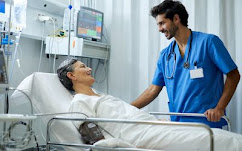Dr Anbarasu's Dairy - CABG - F.A.Qs
Coronary Bypass Operation - F.A.Qs
How risky is it to undergo a Coronary Artery Bypass Surgery ?(CABG).
The risk of Coronary Bypass Operation is very minimal. In a patient with Good Heart Function and no major associated risks like Kidney or Brain issues, the risk of Bypass surgery is less than half a percentage (0.5%)
In case the patient has a poor Heart Function because of a previous Myocardial Infarction (Heart Attack) or if patients have very poor diabetic control or associated Renal issues with high Sr Creatinine or a previous Neurological problems, then the risk of Bypass Operation goes up and the Surgical team will explain the risks involved with the surgery.
What is the normal course of events during a Bypass operation?
Patients are usually admitted the day before the Operation. The Surgical team, Anaesthetist and the Nursing teams brief you about the risks involved in the surgery and the outcomes. Please have a light meal the night before the surgery. The team will inform you about the timing from when you should be fasting for the surgery.
The surgery usually lasts for about 3-4 hours and at the end of surgery your surgeons inform you about the procedure and number of bypass grafts done. If there are any complications to be anticipated, they talk to you in details about that. When the family visits the patient, the patient may be unconscious, connected to the ventilator (breathing machine) There may be multiple lines and tubes connected to the patient.
The patient usually comes off the ventilator the same evening or the next day morning after surgery. All the tubes and lines connected to the patient come out in stages over the next one or two days. Most patients are shifted to the ward by the end of 36-48 hours after surgery unless the surgery has been a high risk or complicated surgery.
How long does the patient stay in the Hospital after Bypass Surgery?
Most patients with a straight forward bypass operation are back in the ward two days after surgery and discharged four to six days after surgery. If it is a high risk surgery, you can expect your Surgeon to inform you about the anticipated extended stay and the probably duration of stay in ICU and ward.
What is the normal course of recovery after Bypass Surgery?You can usually get off the bed on their own.
You can walk as much as possible even when they are in the hospital.
You can lie on their sides.
You can climb stairs - one or two flight of stairs from day three of four after surgery onwards.
You can bend down and sit down.
What are the issues to expect when you get discharged?
You may have a bit of pain for which your Doctors will give yo medications. If the pain is unbearable please inform your doctor.
You may have mild cough, sleep disturbances, loss of appetite and a bit of back pain for the first couple of weeks after bypass surgery.
What are the alarming problems after discharge?
If you get any of the following problems at home after surgery please contact your doctor/hospital immediatelyContinuous fever not responding to paracetamol.
Pus or blood coming out of your chest or leg wound.
Significant breathlessness.
Palpitation - feeling your heart beat fast.
Unbearable chest pain.
What are the exercises to be done at home after discharge?
Please keep yourself physically active after discharge. Please avoid sleeping long hours in the day time.
You can walk well, climb stairs, bend down, sit down and squat.
You can use an Indian Toilet if that is the only one available at home.
Please take bath everyday and keep your wound clean.
What should not be done after surgery?
Please don't drive for 4-6 weeks after surgery. Its not safe.
Please don't lift heavy weight (more than 10 kgs) for the first 8 weeks
How much water can I drink after bypass surgery?
Please keep yourself well hydrated after surgery. Please drink 1.75 - 2.0 litres of water after surgery.
Some patients with reduced heart function, kidney problems Lung related problems will need to be on water restriction after surgery. Your doctors will talk to you in details about that.
What type of food can I have after discharge?
Please take a healthy meal after reaching home. Healthy home cooked is the best any day.
Please have plenty of vegetables and fruits. (Please restrict too much fruits if you are a diabetic)
Please avoid very oily and fatty food. Please avoid junk food and food rich in salty items.
You can have regular amounts of salt in your home cooked food unless your doctor has asked you to restrict salt intake.
You can have healthy non-vegetarian food in moderate amounts.
You can have soups made of vegetables, chicken and bones.
If you have undergone a valve replacement or if you are on anti-coagulation medicines, your doctor will talk to you about avoiding food rich in Vitamin K - Please follow this very strictly.
What are the medical tests to be done after discharge?
At the time of discharge your doctor will tell you when to come for the next check up.
If you are a diabetic, you need to get your blood sugars checked regularly as advised by your doctors.
When you go for a review check-up, your doctor will do basic tests like blood investigations and Chest X-ray.
Have a Safe Recovery.
Please keep yourself active.
Please keep yourself well hydrated.
Please follow the advices given by your Medical Team.
Please take your medications Regularly and go for Check-ups as advised








Comments
Post a Comment